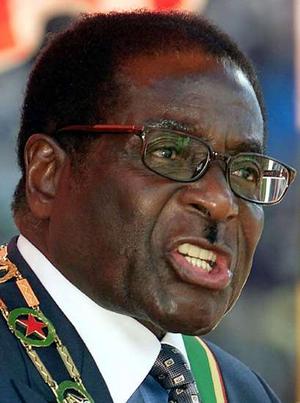The Zimbabwe agreement was put together after South African President Thabo Mbeki realised that events were running out of control and that Robert Mugabe had to be reined in, according to a senior Western diplomatic source.
The implication is that the diplomatic campaign against Mr Mugabe waged by Britain, the US and the EU was not the trigger for change.

The result is some way from the demand by a British government minister in June that "Robert Mugabe has to go."
President Mugabe has not been removed. He has been reduced - but not, it seems, through Western pressure.
The election
According to this account, the sequence of events was this:
President Mugabe thought he would win the elections in March. He was deeply shocked that he did not. His Zanu-PF party was severely rocked and there a moment of crisis during which Mr Mugabe's removal was contemplated. Then the security forces stepped in and said that he would stay and they would fight.
What the diplomat called a "staggering campaign of terror" was unleashed to crush the opposition Movement for Democratic Change (MDC).
 The Zimbabwe agreement: now comes the hard part |
He put the dead at around 2,000, far higher than the 200 given to western governments by the MDC as the death total for its own workers.
"Bodies were strewn across Mashonaland," said the source. The figures are impossible to verify.
The MDC was broken even before the run-off election in June and withdrew.

This galvanised South Africa's neighbours, especially the governments of Zambia and Botswana, and it had its effect on Mr Mbeki. He had always hoped for a deal and was now shocked at the violence.
His fears were confirmed by senior South African military officers, whom he sent to Zimbabwe for a first-hand look. "The real authors of this agreement are chaos and collapse," said the source.
The negotiation
President Mbeki then decided that Mr Mugabe should not be left in sole charge after the election and he told Mr Mugabe this, according to this account.
Part of Mr Mbeki's motivation, it was suggested, was that his time in office was coming to an end and he wanted to have an agreement as part of his legacy.
Zimbabwe's leader began to negotiate.
President Mbeki developed his earlier concept of a power-sharing agreement.
He claimed that Zimbabwe voters had in effect called for this in the March election because the voting was so divided.
He then drafted the agreement.
It nearly failed. At one stage Morgan Tsvangirai almost walked out.
In any event he did not get the transitional arrangements towards new elections and a new government that he had hoped for.
But he accepted the compromise eventually.
The deal
There is now an agreement described by the western diplomat as "the good, the bad and the ugly".
The good, he said, was a commitment to economic change (no more printing of money, for example) and talk of a new constitution (though not for 18 months).
However, the good was balanced by the bad and the ugly.

The most worrying element was a lack of clarity about where power actually lay.
There is to be a cabinet chaired by President Mugabe and a Council of Ministers made up of the same people but chaired by Prime Minister Tsvangirai.
The first will decide policy and the second will carry it out. The MDC and its breakaway faction do have a majority in both.
The share-out of ministries has not been fully agreed, though Mr Mugabe retains control over the military and Mr Tsvangirai says he must have the police.
Western governments think that the agreement could go either way - either to confirm Mr Mugabe in effective control or to confirm a shift of power.
So until this becomes clear, they are refusing to deliver the major economic rescue plan that is waiting in the wings.
Instead they will try to get a quick agreement for humanitarian aid to counter what they regard as creeping starvation in the country.


Tidak ada komentar:
Posting Komentar